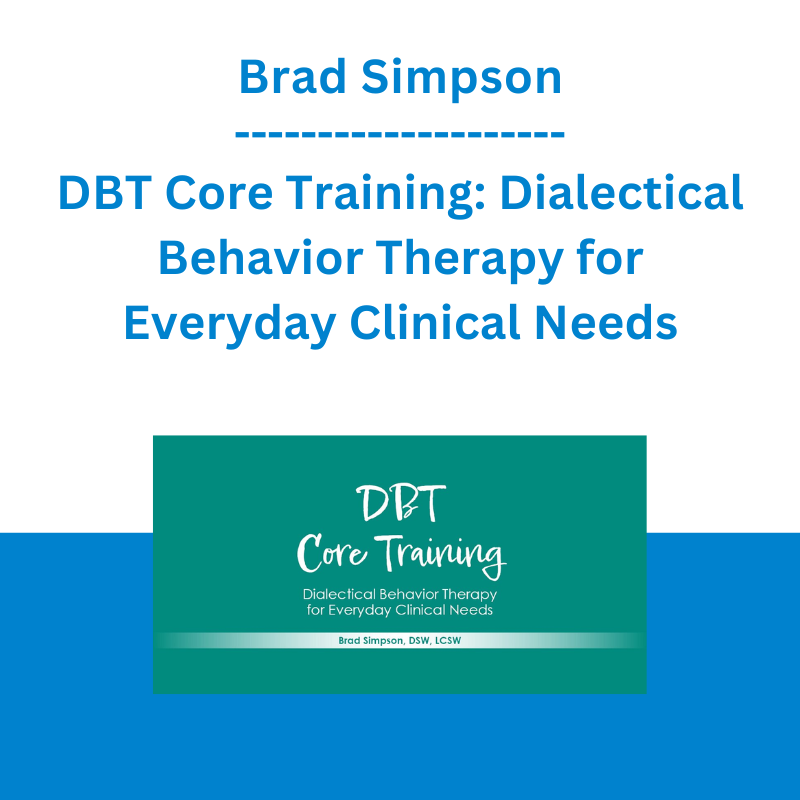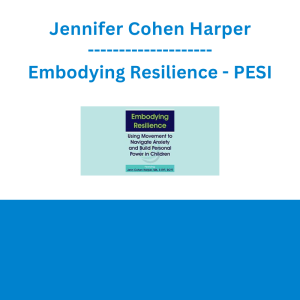*** Proof of Product ***
Exploring the Essential Features of “Brad Simpson – DBT Core Training: Dialectical Behavior Therapy for Everyday Clinical Needs”
Speaker: Brad Simpson, DSW, LCSW
Duration: 6 Hours 27 Minutes
Format: Audio and Video
Copyright: Jul 14, 2023
Media Type: Digital Seminar
Description
You see your clients struggling with severe issues like extreme emotional volatility, personality disorders, self-harm, interpersonal distress and more. You desperately want to help! To keep them from falling back into their destructive behavior patterns. Here’s your opportunity – DBT gives hope and confidence to clinicians and clients alike. The evidence-based Dialectical Behavior Therapy (DBT) approach can be an extremely powerful tool to create the lasting behavioral change you both want!
DBT is perfect for those clients who seem resistant to your current therapeutic techniques. Designed in the early 1990s, DBT helps individuals create a life worth living. It is a synthesis of several therapeutic approaches designed primarily to treat disorders involving emotional dysregulation. In contrast to free-flowing and introspective talk therapies, DBT is a highly structured approach to treatment. Using a combination of behavioral techniques, psycho-educational modules and eastern mindfulness practices, DBT targets the issues that cause intense distress and teaches practical skills for dealing with these issues.
This seminar is designed to help you understand why DBT is so effective with your clients and will lay the groundwork of skills for a solid foundation in DBT.
Don’t wait to give your clients the healing they deserve… see what DBT training can do for you and your practice today!
Speaker
Brad Simpson, DSW, LCSW
Dr. Brad Simpson earned his bachelor’s degree at Brigham Young University, Idaho and followed his passion for social work by pursuing his master’s degree from the University of Utah and his doctoral degree in social work from the University of Tennessee. Brad specializes in working with couples, families, and adolescents in acute inpatient, intensive outpatient, and residential settings. He is intensively trained in Dialectical Behavior Therapy (DBT) and provides trainings for mental health professionals across the United States. Brad has served in several administrative capacities, most recently as executive director of a fully adherent DBT program. He is currently an associate professor and director of the Bachelor of Social Work program at Southern Utah University as well as being the director of research and development at Sunrise Residential Treatment Center, a fully adherent DBT program. Additionally, he is the founder and owner of 3rd Wave Counseling and Consulting.
In addition to research, administrative duties, and clinical practice, Dr. Simpson enjoys teaching undergraduate students, mentoring students, interns, and clinicians. Brad loves running, hiking, mountain biking, lifting weights, long boarding, and spending time with his family.
Brad Simpson is not affiliated or associated with Marsha M. Linehan, PhD, ABPP, or her organization.
Speaker Disclosures:
Financial: N. Bradley Simpson has employment relationships with Tyndale University, Boise State University, Southern Utah University, 3rd Wave Counseling and Consulting, Brigham Young University, and Sunrise Residential Treatment Center. He receives a speaking honorarium and recording royalties from PESI, Inc. He has no relevant financial relationships with ineligible organizations.
Non-financial: N. Bradley Simpson has no relevant non-financial relationships.
Objectives
- Assimilate the theories of DBT and communicate their importance and clinical implications.
- Assess the 4 Modes and Functions of DBT in relation to treatment planning.
- Determine the Stages of Treatment in DBT to utilize within your practice.
- Demonstrate how diary cards can be used by clients to monitor their emotions and track how they are using DBT skills to deal with challenges.
- Effectively utilize a chain analysis with clients to help them gain insight into how they can change
- Demonstrate DBT skills in the areas of Mindfulness, Distress Tolerance, Emotional Regulation and Interpersonal Effectiveness to improve treatment outcomes.
- Support how interpersonal effectiveness exercises can be employed in therapy to help clients keep relationships without sacrificing their self-respect.
- Develop techniques in which clinicians can maximize client buy-in for DBT homework assignments.
Outline
DBT in the Clinical Setting
- Core Philosophies and Practices
- Dialectics Explained
Foundations of DBT
- Why Dialectics and what does that mean anyway?
- Common “Dialectical Dilemmas”
- Biosocial Theory of Borderline Personality
- Disorder… Etiology and why we need to know it
- Engendering compassion and empathy for this “difficult-to-treat” population
- Current research on DBT and why this is important
- Understand high fidelity DBT
Stages and Targets of DBT — Structuring the Treatment
- Pre-Treatment Stage: Orienting the client to treatment and getting commitment
- Identifying and understanding treatment targets
- Stage 1 Target Behaviors: Decrease lifethreatening, therapy interfering and quality of life interfering behaviors and increase DBT skills
- Stage 2 Target Behavior: Decrease posttraumatic stress responses
- Stage 3 Target Behavior: Increase selfrespect and achieve individual goals
- Stage 4 Target Behavior: Increase joy,freedom and spiritual fulfillment
Modes and Functions of DBT
- Individual Therapy — enhancing motivation
- Telephone Consultation — enhancing generalization
- DBT Consultation Group — enhancing motivation & skill of the therapist
- Skills Training — enhancing capabilities
Therapist Tools
- Teaching a client to fill out a diary card
- Review a diary card in an individual therapy session
- Where to look and what to treat on a diary card
- Completing a Behavior Chain Analysis
DBT Skills Training
- Demographics and structure of the DBT
Skills Training Group
- DBT Skills Training Group
- Targets of DBT Skills Training Group
- Roles of facilitators
Core Mindfulness Skills
- Using Core skills to achieve mindfulness
- Become more mindful of thoughts, feelings and urges
- Decrease pejorative thoughts of self and others
- Doing what is needed and being effective
Distress Tolerance Skills
- Tolerate a crisis (without making it worse)
- Help clients “Distract” themselves in their attempts to regulate their emotions
- Self-Soothing the five senses in times of a crisis
- “Radically Accepting”
Interpersonal Effectiveness Skills
- Reduce negative emotion, Objective, relationship, and self-respect effectiveness
- Validation skills for the client and clinician
Emotion Regulation Skills
- Regulate and be effective with emotion
- Reduce emotional vulnerability
- “Building a Life Worth Living”
Target Audience
- Counselors
- Psychologists
- Psychotherapists
- Social Workers
- Marriage & Family Therapists
- Addiction Counselors
- Case Managers
- Nurses
- Mental Health Professionals
Please see the full list of alternative group-buy courses available here: https://lunacourse.com/shop/










 Emanuele Bonanni - My Trading Way
Emanuele Bonanni - My Trading Way  Ronald D. Siegel - Mindfulness Exercise for Chronic Pain
Ronald D. Siegel - Mindfulness Exercise for Chronic Pain  Louise Yamada - Market Magic: Riding the Greatest Bull Market of the Century
Louise Yamada - Market Magic: Riding the Greatest Bull Market of the Century  SMB - Options Training
SMB - Options Training  Dave Landry - Stock Selection Course
Dave Landry - Stock Selection Course  Chris Capre - Advanced Price Action Ongoing Training & Webinars
Chris Capre - Advanced Price Action Ongoing Training & Webinars  The Daily Traders – Exclusive Trading Mentorship Group
The Daily Traders – Exclusive Trading Mentorship Group  Crypto Dan - The Crypto Investing Blueprint To Financial Freedom By 2025
Crypto Dan - The Crypto Investing Blueprint To Financial Freedom By 2025  Racing Workshop - Complete Online Package
Racing Workshop - Complete Online Package  Simpler Trading - Bruce Marshall - The Options Defense Course
Simpler Trading - Bruce Marshall - The Options Defense Course  Atlas API Training - API 570 Exam Prep Training Course
Atlas API Training - API 570 Exam Prep Training Course  Matthew Kratter - Trader University
Matthew Kratter - Trader University  Trio Chausson - Fanny & Felix Mendelssohn
Trio Chausson - Fanny & Felix Mendelssohn  Alton Hardin - Crush Micro Stakes Online Poker
Alton Hardin - Crush Micro Stakes Online Poker  Anil Batra - GA4, GTM, BigQuery, and Data Studio Fundamentals - Mini Workshop
Anil Batra - GA4, GTM, BigQuery, and Data Studio Fundamentals - Mini Workshop  Gumroad Guru - The Persuasion Code - How to Start and Scale Your Affiliate Marketing
Gumroad Guru - The Persuasion Code - How to Start and Scale Your Affiliate Marketing  Jesse Livermore Trading System - Joe Marwood
Jesse Livermore Trading System - Joe Marwood  Ready Set Crypto - Crypto Bootcamp All You Need To Know To Make $$ With Crypto
Ready Set Crypto - Crypto Bootcamp All You Need To Know To Make $$ With Crypto  Money Miracle - George Angell - Use Other Peoples Money To Make You Rich
Money Miracle - George Angell - Use Other Peoples Money To Make You Rich  Jessica Caver Lindholm - Sell Like a Boss
Jessica Caver Lindholm - Sell Like a Boss  Courtney Holmes - Filming Families: The Modern Family Video
Courtney Holmes - Filming Families: The Modern Family Video  Cody Neer - Ecommerce Brand Academy
Cody Neer - Ecommerce Brand Academy  Wilco De Kreij Protect Your Facebook Ad Account
Wilco De Kreij Protect Your Facebook Ad Account  Lillian Gibson - Culturally Affirming Practices for Whole Person Treatment - PESI
Lillian Gibson - Culturally Affirming Practices for Whole Person Treatment - PESI  Matan Feldman - The 13-Week Cash Flow Modeling - Wall Street Prep
Matan Feldman - The 13-Week Cash Flow Modeling - Wall Street Prep  Nathan Fluellen - Discovering West Africa: Ghana, Senegal, Cameroon
Nathan Fluellen - Discovering West Africa: Ghana, Senegal, Cameroon  Brynne Tillman & Bill McCormick - Mastering Linkedin for Social Selling | Advanced Prospecting and Networking - Sales Gravy
Brynne Tillman & Bill McCormick - Mastering Linkedin for Social Selling | Advanced Prospecting and Networking - Sales Gravy  The Video formula - Kevin Anson
The Video formula - Kevin Anson  Forexmentor - Recurring Forex Patterns
Forexmentor - Recurring Forex Patterns  Vladimir Vasiliev - Path to Mastery 1 (downloadable in 2 parts*)
Vladimir Vasiliev - Path to Mastery 1 (downloadable in 2 parts*)  Terry Real - Teaching Men Love: How to Challenge Traditional Masculinity's Playbook - PESI
Terry Real - Teaching Men Love: How to Challenge Traditional Masculinity's Playbook - PESI  George Fontanills & Tom Gentile - Optionetics 6 DVD Series Home Study Course (Digital Download)
George Fontanills & Tom Gentile - Optionetics 6 DVD Series Home Study Course (Digital Download)  Julie Stoian & Cathy Olson - Launch Gorgeous - Funnel Gorgeous Bundle
Julie Stoian & Cathy Olson - Launch Gorgeous - Funnel Gorgeous Bundle  Tara Brach - Awaken Your Heart, Creativity & Wisdom
Tara Brach - Awaken Your Heart, Creativity & Wisdom  Brain Care: Applying the Neuroscience of Well-Being - Linda Graham
Brain Care: Applying the Neuroscience of Well-Being - Linda Graham  Adam Gilad - Interview With Satyen Raja
Adam Gilad - Interview With Satyen Raja  Toshko Raychev - Profit System + ITF Assistant
Toshko Raychev - Profit System + ITF Assistant  Steve G, Jones - Explore Hand Writing
Steve G, Jones - Explore Hand Writing  Frank Kern - The Invisible Offer
Frank Kern - The Invisible Offer  Jared Platt - Editing and Retouching in Lightroom Mobile
Jared Platt - Editing and Retouching in Lightroom Mobile  Sara Gottfried - Fast Track Your Hormone Cure (10-Day Program)
Sara Gottfried - Fast Track Your Hormone Cure (10-Day Program)  Patricia Arredondo - BT18 Keynote 01 - LatinX Immigrant Resilience in the Midst of Change and Challenges
Patricia Arredondo - BT18 Keynote 01 - LatinX Immigrant Resilience in the Midst of Change and Challenges  Sandra Ingerman - Shamanic Journeying With the Spirits of Nature - The Shift Network
Sandra Ingerman - Shamanic Journeying With the Spirits of Nature - The Shift Network  Kelli Marie Connor - Hype & Reminders Workflow - CRM Workflow Bundle
Kelli Marie Connor - Hype & Reminders Workflow - CRM Workflow Bundle  Alex Brogan - The Sovereign Creator – Grow a 6-figure audience (without leaving your day job)
Alex Brogan - The Sovereign Creator – Grow a 6-figure audience (without leaving your day job)  Danny Zacharias - Mastering Logos Bible Software to Supercharge Your Bible Study!
Danny Zacharias - Mastering Logos Bible Software to Supercharge Your Bible Study!  Jennifer Cohen Harper - Embodying Resilience: Using Movement to Navigate Anxiety and Build Personal Power in Children - PESI
Jennifer Cohen Harper - Embodying Resilience: Using Movement to Navigate Anxiety and Build Personal Power in Children - PESI  Ed Ponsi - Forex Trading
Ed Ponsi - Forex Trading  Brooke Wimer - Animal-Assisted Interventions: An Incredible Range of Therapeutic Benefits - PESI
Brooke Wimer - Animal-Assisted Interventions: An Incredible Range of Therapeutic Benefits - PESI  Max Bush - Sex Positions: Master The Climax With Advanced Guided Sex Positions For A Better Sex Life, With Pictures
Max Bush - Sex Positions: Master The Climax With Advanced Guided Sex Positions For A Better Sex Life, With Pictures  Charles Floate - Strategies & Stories From SEO Millionaires
Charles Floate - Strategies & Stories From SEO Millionaires  George Fontanills & Tom Gentile - Optionetics Wealth Without Worry Course
George Fontanills & Tom Gentile - Optionetics Wealth Without Worry Course  Talmadge Harper - Harper Healing - Sophia's Endless Joy, Happiness, and Bliss
Talmadge Harper - Harper Healing - Sophia's Endless Joy, Happiness, and Bliss  Roger and Barry - Virtual Vegas Front Seat
Roger and Barry - Virtual Vegas Front Seat  Hameed Ali - Brilliancy: The Essence of Intelligence (Diamond Body Series)
Hameed Ali - Brilliancy: The Essence of Intelligence (Diamond Body Series)  NLP Times - Getting OnBoard With NLP
NLP Times - Getting OnBoard With NLP  $200Day With Facebook Pages Black Hat Course 2021
$200Day With Facebook Pages Black Hat Course 2021  Tony Shepherd - Natural Part-Timers Workshop
Tony Shepherd - Natural Part-Timers Workshop  Ezra Firestone - Smart Social Live - Smart Marketer
Ezra Firestone - Smart Social Live - Smart Marketer  Stephen Cowan - How To Raise Happy, Healthy & Well-Adjusted Children
Stephen Cowan - How To Raise Happy, Healthy & Well-Adjusted Children  Travel Photography - Andy Katz
Travel Photography - Andy Katz  Markets 101 Complete Course with Joseph Wang - Central Banking 101
Markets 101 Complete Course with Joseph Wang - Central Banking 101  John Martinez - REI Sales Academy
John Martinez - REI Sales Academy  Donald Trump - Trump Never Give Up: How I Turned My Biggest Challenges into Success
Donald Trump - Trump Never Give Up: How I Turned My Biggest Challenges into Success  Blaine Singer - Team Code of Honor
Blaine Singer - Team Code of Honor  The Secret Trench Reports - Top 50 Most Lucrative Niches
The Secret Trench Reports - Top 50 Most Lucrative Niches  CHRIS ORLOB - The Underground SaaS Sales Scripts : Trilogy E-Book Series
CHRIS ORLOB - The Underground SaaS Sales Scripts : Trilogy E-Book Series  Benny Lewis - Fluent in 3 Months Premium Package (12+ Languages)
Benny Lewis - Fluent in 3 Months Premium Package (12+ Languages)  Steven Frankel - BT16 Law and Ethics - “What goes around…”, Part 02
Steven Frankel - BT16 Law and Ethics - “What goes around…”, Part 02  Bruce Frantzis - Chi Gung for the Sexes
Bruce Frantzis - Chi Gung for the Sexes